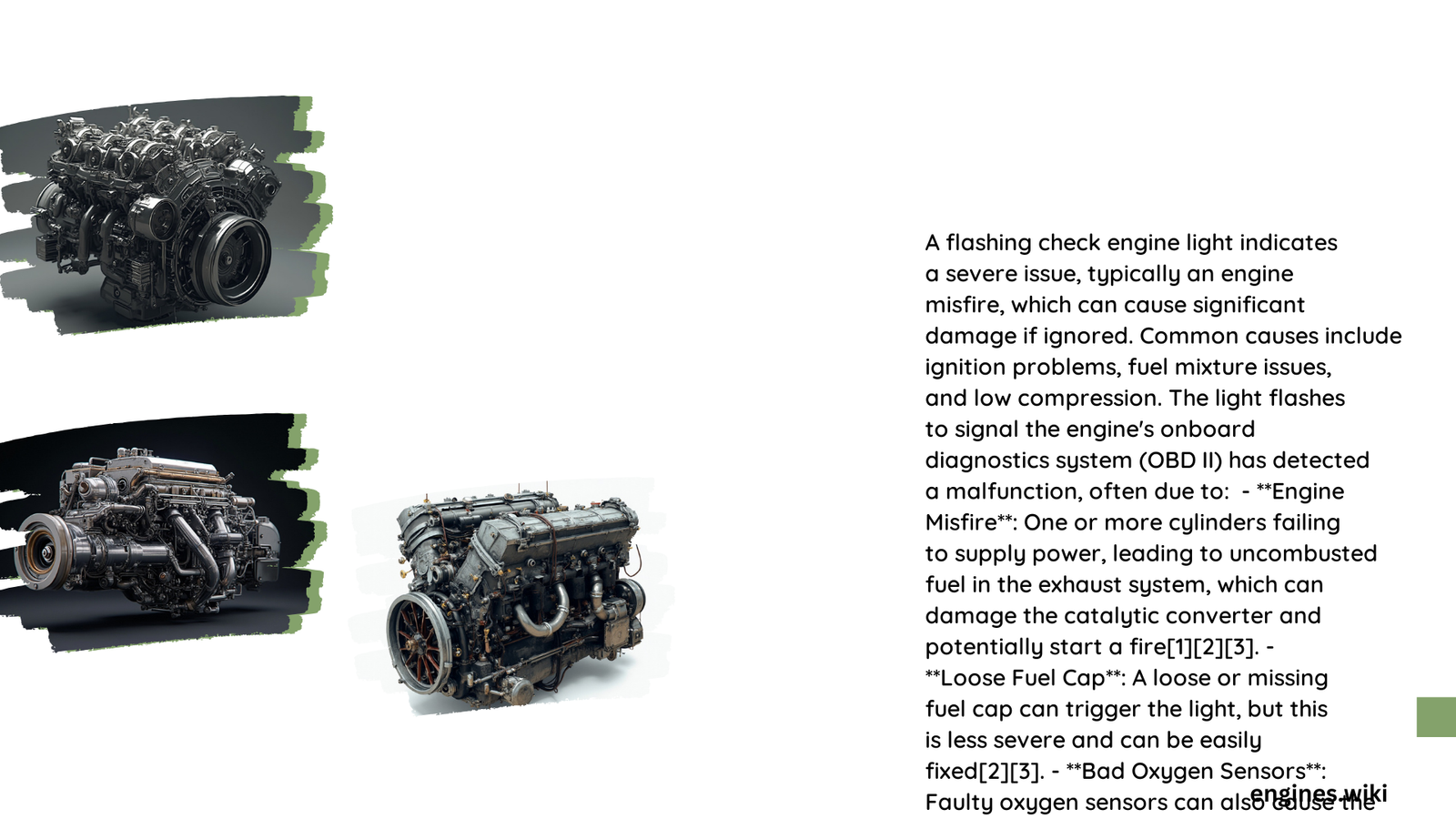A flashing check engine light is a serious warning that requires immediate attention, even if your car seems to be running normally. This situation typically indicates a severe engine problem that could lead to costly damage if ignored. Understanding the causes, symptoms, and necessary actions can help you address the issue promptly and potentially save you from expensive repairs.
What Are the Common Causes of a Flashing Check Engine Light?
Several issues can trigger a flashing check engine light, even when your car appears to be running fine:
- Engine Misfire: This is one of the most frequent causes. It can result from:
- Faulty spark plugs
- Damaged ignition coils
- Malfunctioning fuel injectors
-
Failing oxygen sensors
-
Catalytic Converter Problems: A damaged or clogged catalytic converter can cause the light to flash.
-
Fuel System Issues: These may include:
- Fuel pump failure
- Clogged fuel injectors
-
Blocked fuel filter
-
Oxygen Sensor Malfunction: These sensors monitor exhaust oxygen levels and can trigger the light if faulty.
-
Ignition System Problems: Issues with components like ignition coils or distributors can cause the light to flash.
What Symptoms Might Accompany a Flashing Check Engine Light?

Even if your car seems to run fine, you might notice subtle symptoms:
- Slight vibrations or shaking, especially during acceleration or idling
- Inconsistent or jerky acceleration
- Minor power loss
- Unusual engine sounds
- Fluctuations in RPM (visible on the tachometer)
How Can I Diagnose the Problem?
To properly diagnose the issue, follow these steps:
-
Use an OBD-II Scanner: This tool can retrieve Diagnostic Trouble Codes (DTCs) and provide real-time data.
-
Perform a Visual Inspection: Check for obvious signs of damage or loose connections.
-
Examine the Ignition System: Inspect spark plugs, ignition coils, and wires for wear or damage.
-
Check the Fuel System: Look for clogged injectors or fuel pump issues.
-
Assess Sensor Function: Use the OBD-II scanner to check sensor readings.
-
Clear Codes and Test Drive: After addressing any issues, clear the DTCs and test drive the vehicle.
When Does a Flashing Check Engine Light Typically Occur?
A flashing check engine light can occur under various conditions:
- During extreme temperatures
- When using poor quality fuel
- Under challenging driving conditions
- During rapid acceleration or deceleration
It’s important to note that while the car may seem to run fine, a flashing check engine light always indicates a serious issue that requires immediate attention.
What Are the Potential Consequences of Ignoring a Flashing Check Engine Light?
Ignoring a flashing check engine light can lead to:
- Severe engine damage
- Catalytic converter failure
- Decreased fuel efficiency
- Increased emissions
- Costly repairs or even engine replacement
How Can I Prevent Issues That Cause a Flashing Check Engine Light?
To minimize the risk of encountering this problem:
- Follow your vehicle’s maintenance schedule
- Use high-quality fuel
- Address minor issues promptly
- Drive responsibly
- Have regular check-ups with a qualified mechanic
Remember, a flashing check engine light is a critical warning. Even if your car seems to run fine, it’s crucial to have it checked immediately to prevent potential severe damage and ensure your safety on the road.
